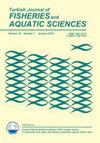Selection of Appropriate Housekeeping Genes for Gene Expression Normalization in Hybrid Grouper (Epinephelus fuscoguttatus ♀ × E. lanceolatus ♂)
IF 1.7
4区 农林科学
Q3 FISHERIES
引用次数: 0
Abstract
Since lots of researches using qPCR technique have addressed gene expression in groupers, the suitable housekeeping genes are needed to obtain reliable and precise results. In this study, by using different mathematical algorithms (Genorm, normFinder, BestKeeper and comparative ΔCt method) and the comprehensive ranking software (RefFinder), the stability of seventeen housekeeping genes were assessed in eleven tissues of the hybrid grouper (Epinephelus fuscoguttatus ♀ × E. lanceolatus ♂). Results showed that the stability of housekeeping genes were various in different tissues and the newly identified housekeeping genes were likely more stable than that of commonly used. In conclusion, the expression stability of housekeeping genes showed a tissue-specific manner, and the conserved oligomeric Golgi complex subunit 5 (cog5) and peroxisomal biogenesis factor 14 (pex14) could be universally used as appropriate housekeeping genes across different tissues in hybrid grouper. The present study provides the foundation for more accurate results of qPCR assay in hybrid grouper and other groupers.杂交石斑鱼基因表达正常化的适宜管家基因选择♀ ×E.lanceolatus♂)
由于大量的qPCR技术研究都是针对石斑鱼的基因表达,因此需要合适的管家基因来获得可靠和精确的结果。本研究采用Genorm、normFinder、BestKeeper和comparative ΔCt等不同的数学算法和RefFinder综合排序软件,对杂交石斑鱼(Epinephelus fuscoguttatus♀× E. lanceolatus♂)11个组织中17个管家基因的稳定性进行了评价。结果表明,不同组织中管家基因的稳定性存在差异,新鉴定的管家基因可能比常用的管家基因更稳定。综上所述,保守的低聚高尔基复合体亚基5 (cog5)和过氧化物酶体生物发生因子14 (pex14)可作为杂交石石鱼不同组织间普遍适用的内源基因。本研究为杂交石斑鱼和其他石斑鱼qPCR检测结果的准确性奠定了基础。
本文章由计算机程序翻译,如有差异,请以英文原文为准。
求助全文
约1分钟内获得全文
求助全文
来源期刊

Turkish Journal of Fisheries and Aquatic Sciences
FISHERIES-MARINE & FRESHWATER BIOLOGY
CiteScore
3.10
自引率
0.00%
发文量
43
审稿时长
3 months
期刊介绍:
Turkish Journal of Fisheries and Aquatic Sciences" (TrJFAS) is a refereed academic journal has been published by Central Fisheries Research Institute of Turkey and Japan International Cooperation Agency (JICA), and published in English.
It aims to address research and needs of all working and studying within the many varied areas of fisheries and aquatic sciences.
The Journal publishes English language original research papers, critical review articles, short communications and technical notes on applied or scientific research relevant to freshwater, brackish and marine environments.
TrJFAS was published biannually (April & November) between 2001 and 2009. A great number of manuscripts have been submitted to the journal for review from acceptance of the SCI index. Thereby, the journal has been published quarterly (March, June, September and December) from 2010 to 2017. The journal will be published monthly in 2018.
 求助内容:
求助内容: 应助结果提醒方式:
应助结果提醒方式:


